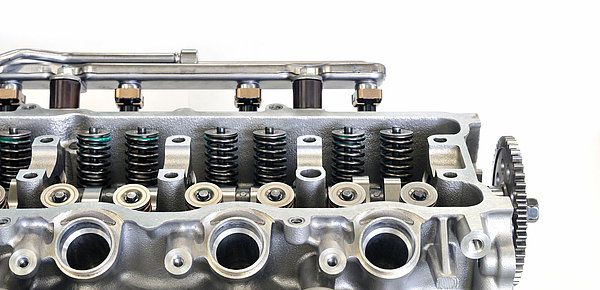
|

No CAD System Menagerie Thanks to OpenDESC.comby Sergej Bondar Automotive suppliers are often faced with the question of whether to design parts using the same CAD system that their customers employ or converting them into the desired format afterwards. One manufacturer of valve train components decided against acquiring a "menagerie" of CAD systems because of the cost involved and uses the conversion service OpenDESC.com instead. It ensures that customers receive the CAD data on time and with the desired level of quality. The components used in valve trains are subject to rather extreme thermal and mechanical stresses when an engine is running. High thermal conductivity, high natural lubricity and good hot tensile properties are therefore key requirements that the components must satisfy. When it comes to the design, the powder metallurgical material compounds play a crucial role, which is why the customers need advice. Since relatively simple geometrically shaped parts are involved, they can be designed using one of the less expensive midrange systems –or at least that would be the case if it weren't for the customers. Customers demand native data It is not only the technical requirements relating to the valve drive components that are becoming increasingly sophisticated but also the customers' requirements when it comes to data communication and documentation. It used to be that the design engineers were given a 2D drawing as the basis for their work, and they simply sent the models and drawings of their design proposals back to the customer by post in STEP format or as a PDF file. Nowadays, several OEMs expect models to be provided in the native formats of the CAD system they employ so that they can use them for digital validation. The company therefore was faced with the alternative of either installing several CAD licenses for the customer systems and training the users how to use the software and the OEM-specific configurations or outsourcing the data conversion process to an external service provider. For cost reasons, a decision was made in favor of using PROSTEP's OpenDESC.com conversion service, which is distinguished by the fact that all leading OEM-specific configurations are stored and can be updated immediately if changes are made. According to the Head of Design, buying and maintaining the software and training the users would have been much more expensive, especially in light of the fact that the need for conversion is not yet that great and varies from project to project. The company also did not have the staff capacity it would have needed. 
Uniform conversion process The new data conversion process is structured in such a way that the design engineers can upload their drawings and models once they have been reviewed and approved internally via the OpenDESC portal and select the recipient or the project. All the other steps run in the background, which means they can immediately continue with their design engineering work. If, for example, Ford is the recipient, the data is converted to the CATIA V5 format using the OEM-specific initial model and checked directly into the automotive manufacturer's Teamcenter PLM system. The person commissioning the conversion is immediately informed that the data has been delivered correctly. This normally occurs within two days of an order being placed. 
OpenDESC.com also converts incoming CAD data if one of the OEMs has made the data available in a native format that the company's design engineers cannot read. In this case, the conversion service makes the data available to them for downloading in STEP format as the geometries do not require further processing. They are mainly intended to indicate deviations from the generic valve seat inserts and valve guides for which the design engineers have created parametric templates. The STEP data is saved together with the company's own CAD data in the enterprise PDM system. The manufacturer has only been using the conversion service for a few months. The key beneficial effect, aside from the cost savings, is the high level of process reliability and the fact that there is a single uniform and binding conversion process for all the users. It is guaranteed that the data can be made available on time and with the desired level of quality without somebody having to spend a lot of time and effort dealing with countless customer-specific configurations, which for good measure are constantly changing. Another advantage of the solution is the flexible invoicing model: If the conversion volume increases, it is easy to switch from invoicing on the basis of individual orders to a flat rate. |
|
| © PROSTEP AG | ALL RIGHTS RESERVED | IMPRESSUM | DATENSCHUTZERKLÄRUNG | HIER KÖNNEN SIE DEN NEWSLETTER ABBESTELLEN. |
